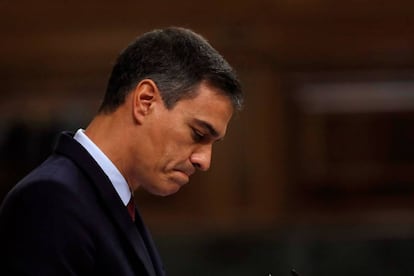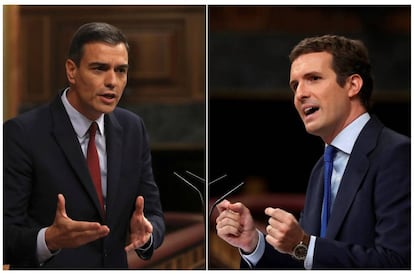Acting PM urges Congress to back him so “Spain does not end up deadlocked”
During day one of this week’s investiture debate, Pedro Sánchez draws heavy criticism from the opposition for failing to mention the Catalan crisis

Spain’s acting prime minister, Pedro Sánchez, on Monday urged Congress to entrust him with office so that Spain “does not end up deadlocked.”
The leader of the Socialist Party (PSOE) said that on April 28 Spaniards voted for “a progressive, environmentalist, feminist and pro-European government.”
With them you’ll manage to get invested with power, but you will be unable to govern
Pablo Casado, PP leader
Nearly three months after winning the general election, Sánchez is still trying to put together enough of a majority to form a government. If he fails, Spain could be facing a fresh election in the fall – the fourth in less than four years.
Despite a comfortable victory in April that gave him 123 seats in the lower house of parliament, Sánchez is still well short of the 176 required for an absolute majority. And 80 days of talks with the anti-austerity Unidas Podemos, the Socialists’ most likely partner, have yet to yield any clear results.
In a two-hour address, Sánchez discussed the challenges that he will be tackling as the new leader of Spain: “Unemployment and precarious jobs, the digital revolution, the climate emergency, the discrimination of women and the future of Europe.” He also defended constitutional reforms to prevent future situations of post-election deadlock.
In an apparent remark to the far-right Vox party, Sánchez said about gender violence: “To those wishing to minimize this dramatic situation, to go back to the past or to make up conspiracy theories, they should know that they’re going to have us standing across from them.”

Towards the end of his speech, Sánchez appealed directly to Unidas Podemos: “Dealmaking is not easy, but we are united by the promise of the left.”
Podemos, which was aiming for a coalition government with the Socialists, says that so far Sánchez has only offered them “symbolic responsibilities” within his future government. The latter holds that a joint government with Podemos would be impossible due to irreconcilable differences over critical matters such as the situation in Catalonia.
The Catalan question
On Monday, Sánchez avoided discussing Catalonia at all. This omission drew heavy criticism from opposition parties across the political spectrum, from the conservative Popular Party (PP), to the center-right Ciudadanos, far-right Vox, and the regional parties Catalan Republican Left (ERC), Navarra Suma, Canaries Coalition, Compromís, Regionalist Party of Cantabria and even the Basque radical-left Bildu.
The ERC’s congressional speaker, Gabriel Rufián, called it “irresponsible and negligent.” And the head of the main opposition PP, Pablo Casado. noted: “You haven’t seen the white elephant, and it was right there.”
Dealmaking is not easy, but we are united by the promise of the left
Pedro Sánchez, acting PM
At one point Casado also talked about “the purple elephant with yellow ribbons,” reinforcing his main message that Sánchez is hostage to Podemos (whose party color is purple) and the Catalan separatists (who use yellow ribbons as symbols of support for jailed secessionist leaders): “With them you’ll manage to get invested with power, but you will be unable to govern,” he predicted.
Some of the smaller parties could hold the key to Sánchez’s successful return to office if he does not secure an absolute majority on Tuesday and a second round of voting is held on Thursday, as seems increasingly likely. At that point the Socialist candidate would only need a simple majority of more yes than no votes, and abstentions could prove critical.
English version by Susana Urra.
Tu suscripción se está usando en otro dispositivo
¿Quieres añadir otro usuario a tu suscripción?
Si continúas leyendo en este dispositivo, no se podrá leer en el otro.
FlechaTu suscripción se está usando en otro dispositivo y solo puedes acceder a EL PAÍS desde un dispositivo a la vez.
Si quieres compartir tu cuenta, cambia tu suscripción a la modalidad Premium, así podrás añadir otro usuario. Cada uno accederá con su propia cuenta de email, lo que os permitirá personalizar vuestra experiencia en EL PAÍS.
¿Tienes una suscripción de empresa? Accede aquí para contratar más cuentas.
En el caso de no saber quién está usando tu cuenta, te recomendamos cambiar tu contraseña aquí.
Si decides continuar compartiendo tu cuenta, este mensaje se mostrará en tu dispositivo y en el de la otra persona que está usando tu cuenta de forma indefinida, afectando a tu experiencia de lectura. Puedes consultar aquí los términos y condiciones de la suscripción digital.








































